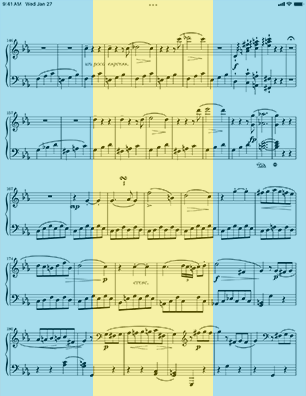Basics
Welcome to forScore! Here are a few quick things you should know before you get started.
Turning Pages
Turn the page with two basic kinds of gestures: swipes and taps. Swipe left or right across the screen like flipping through pages in a book, or simply tap either side of the screen once. When using a trackpad or mouse, click the sides of the page or scroll to turn pages.
Landscape
To get a better view of your score, turn your device sideways: the page will fill up the screen’s width and extend downward if necessary. Swipe or tap to scroll from top to bottom and between pages, or drag the page up and down with your finger.
Controls
To help you get the best view of your music, forScore’s controls are hidden by default. A quick, single tap or click in the middle of the page reveals these controls:

This bar along the top of the screen gives you access to six important items (in blue): scores, bookmarks, and setlists on the left, and search, audio utilities, and the tools menu on the right. These items are discussed in greater detail throughout this guide.
The area in the middle of the toolbar displays the current item’s title, composer, and gives you quick access to commonly used tools and functions. The icon on the left shows the Display Options overlay (learn more below), and the icon on the right presents a menu that includes additional options related to the piece of music you’re currently viewing.
Seek Bar
Along the bottom of the page, a slider control allows you to quickly preview and jump to any page in the current score. If you’ve added bookmarks to your score, the name of the bookmark hovers above the white dot as you scroll or drag it across the screen.
Zoom
Place two fingers on the screen (or trackpad) and move them farther apart to zoom in, or closer together to zoom out. Double-tap while zoomed in to return to the normal size, and double-tap while zoomed out to show additional display options.
Display Options
Double tap the center of the page or tap the grid icon in the title bar to show the Display Options overlay which gives you quick access to window-specific options including presentation, layout, and page turning functions or behaviors.
Display modes let you control how your music is presented: standard mode uses a common 3:4 aspect ratio to ensure the page looks the same on every device, best fit mode gives you a better view but may clip some annotations, and zoomed mode makes the page as big as possible but may clip the left and right edges of your music. When you’re viewing a single page in landscape orientation, choose between the default scrolling behavior and a best fit mode that shrinks the page to fit on the screen.
This overlay also gives you quick access to half page turns (in portrait orientation), two-up mode (in landscape orientation), visual effects like Sepia, and page turning modes like performance mode, Reflow, Face Gestures, and more. Tap and hold certain items to access additional settings or configuration options, if applicable. When an external display is connected, this overlay also shows additional options related to video output.

